Results: Will autonomous cars create more jobs?
Will robots take away our jobs? Will we be better off with robots even if they do? Take a look and see this round-up of stats concerning the issue.
One Forbes article published last year by Chunka Mui brought the issue to the autonomous cars domain. In the article titled “Will The Google Car Force A Choice Between Lives And Jobs?”, Mui says that even if more jobs will be lost as people start to adopt autonomous cars technology, he’d support the autonomous cars because they will ultimately help save more lives. Indeed, in our earlier poll on the topic of autonomous cars, we found that one of the top benefits of autonomous cars voted by our participants is in reduction/prevention of traffic accidents.
Two weeks ago, we posed the jobs questions to you. Here’s what you’ve told us.
Which jobs would most likely be displaced or created?
When we asked which jobs are more likely to be displaced, almost all participants (95%) pointed to taxi drivers. It doesn’t really take much imagination to conjure up the images of an autonomous car driving around as a taxi cab of the future. But this image brings up some interesting implications. Mui thinks autonomous cars might do to taxi drivers what self-service and home laundry machines did to Chinese laundry business a few decades ago — one of two trades that used to be a go-to means of living for landed Chinese immigrants to the United States until it went obsolete in 1970s. Mui says,
Just as washing machines eliminated Chinese laundries, fully driverless vehicles would eliminate many professional driving jobs—including many, like taxi-driving, that form an economic bridge for current immigrants.
It’s not just the taxi drivers that people perceive to be in danger of being displaced by autonomous cars. Over 60% of people said that public transit workers (e.g., bus drivers), large goods delivery people (e.g., truckers), and small goods delivery people (e.g., pizza delivery) are all in danger of being displaced by the technology (69%, 67%, and 61% respectively). Fewer votes went to parking attendants or police (45%), motor trade insurance jobs (41%), traffic police (39%) and auto mechanics (9%).
We had to be a little bit more imaginative with the jobs that may be created with the rise of autonomous cars. All participants agreed that there’ll be at least one type of jobs created by the technology, most popular of which are jobs in autonomous cars design and development (78%). This was followed by 67% of the votes for jobs in building new infrastructure for autonomous cars (e.g., new type of parking spaces), and 55% in businesses that involve autonomous cars (e.g., services to use autonomous cars as a mobile storage unit). Fewer votes went to more blue collar jobs, such as new type of delivery and service jobs (e.g., personalized flower deliveries by a person for that extra ‘human touch’, 36%), jobs in autonomous car manufacturing (e.g., workers at automotive factories, 33%), new insurance-related jobs (20%) and auto mechanics (16%).
Do you think more jobs will be created than displaced?

Given the type of jobs that people expect to be displaced or created by the technology, we were curious whether the outlook on the jobs issue was more positive or negative in people’s minds. According to our poll results, 73% of our readers believe more jobs will be displaced by the autonomous cars technology. Only 19% of readers said that more jobs will be created.
This is in contrast to a more generic recent report by Pew Research Center, a nonpartisan fact tank group in the US. The report indicated that 52% of experts they’ve surveyed believe AI and robotics (not autonomous cars in particular) will have an overall positive or neutral impact on jobs. It’s possible though, that it’s harder to make a prediction on a technology’s impact on jobs when the scope of the technology in question is as large as AI and robotics, rather than specific to autonomous cars technology. But for now, it seems that most people are expecting the job market to be gloomier as autonomous cars start to hit the road mainstream.
Overall, do you think autonomous cars will have a positive impact on our society?
 The bigger, and important question is whether we care about the jobs issue or not. Even if more jobs will be displaced, do we still want autonomous cars? The answer from our participants is a loud and clear yes. In fact, only one participant (2%) said that the cars will have an overall negative effect, in contrast to 90% of participants who voted in the positive.
The bigger, and important question is whether we care about the jobs issue or not. Even if more jobs will be displaced, do we still want autonomous cars? The answer from our participants is a loud and clear yes. In fact, only one participant (2%) said that the cars will have an overall negative effect, in contrast to 90% of participants who voted in the positive.
In a way, it seems to tell us that the jobs question doesn’t matter as much when it comes to discussing autonomous cars. Some of the anticipated benefits of the technology may just be big enough to compensate for the negative impact it may bring to our jobs. This is a good news for those investing in the technology. But how can we better prepare for the future? Should all taxi drivers learn to code and design so that they can join the foreseeable new job openings in autonomous car design and development?
Lee Vinsel, an Associate Professor of Science and Technology Studies at the Stevens Institute of Technology paints an interesting picture. In his December 2013 blog post, Autonomous Vehicles and the Labour Question,
Some even claim that the answer is that everyone should learn to code (as if we are all going to join the technical elite). Yet, we live in a increasingly unequal society, and our use of technology plays a central role in this troubling trend. Silicon Valley famously has an inverted bell curve around education. It’s a society made up of, on one side, hyper-educated, wealthy elites and, on the other, uneducated people who work for the wealthy, care for their children, and keep their lawns looking beautiful. Our use of labor-saving technology, like autonomous cars, only exacerbates this divide. American society has been remarkably tolerant of replacing people with machines and the technological unemployment such adoption entails. Perhaps we will grow less tolerant of it as data mining systems drastically reduce the need for lawyers and medical robots dramatically decrease the number of surgeons necessary. What are we going to do all day?
It will be interesting to see how the answers to these questions change as we start to see fully autonomous cars on the road, perhaps forcing us to keep our resumes up to date. For now, we will have to leave the discussion here.
What ORi and Robohub found out about autonomous cars
 The Open Roboethics initiative (ORi) have been designing and publishing biweekly polls and discussing the topic of autonomous cars with Robohub since late April of this year. Unfortunately, it’s time for us to conclude our discussion on this topic and move on to a new one — but don’t worry, it’ll be just as exciting.
The Open Roboethics initiative (ORi) have been designing and publishing biweekly polls and discussing the topic of autonomous cars with Robohub since late April of this year. Unfortunately, it’s time for us to conclude our discussion on this topic and move on to a new one — but don’t worry, it’ll be just as exciting.
We opened our discussion by asking what people think about autonomous cars technology, found out that people are more reluctant to let children ride the cars alone than they are with unlicensed blind people or seniors, and that we are torn in terms of who should be responsible if an autonomous car were to get a speeding ticket. We found that people are OK with empty cars roaming around the streets by itself, but not OK with people under the influence of drugs or alcohol hopping behind the wheels if the car requires at least some input from the passenger/driver.
 While people were split on whether they will miss driving as fully autonomous cars become mainstream, we also reminisced about the films from the 80’s and the cars that can talk to us when we imagined the kind of ways we’d like to interface with our future robotic cars.
While people were split on whether they will miss driving as fully autonomous cars become mainstream, we also reminisced about the films from the 80’s and the cars that can talk to us when we imagined the kind of ways we’d like to interface with our future robotic cars.
We pondered about some tough ethical dilemma questions with you about how a car should behave when an accident is unavoidable, resulting in your death or death of a child, and why. Through a set of dilemma situations, we learned about the complex implications of designing optimization algorithms for unavoidable crashes leading some of us to prefer random decision making than informed ones.
We feel that we’ve learned a lot and accomplished a lot in a relatively short period of time. It’s all thanks to all of you who have read our analyses, taken polls, and provided us with interesting comments. With a big thank you, we’ll be back tomorrow with a brand new poll discussion on a brand new topic.
The results of the poll presented in this post have been analyzed and written by AJung Moon, Mike Van der Loos, Shalaleh Rismani, Camilla Bassani, and Jason Millar at the Open Roboethics initiative.

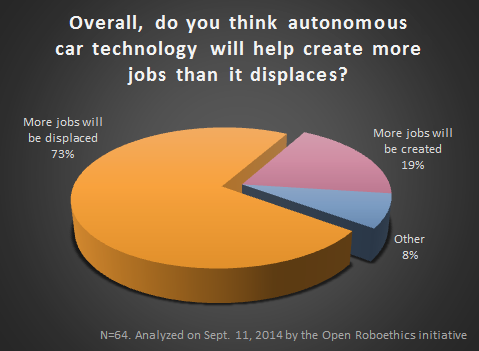


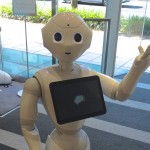
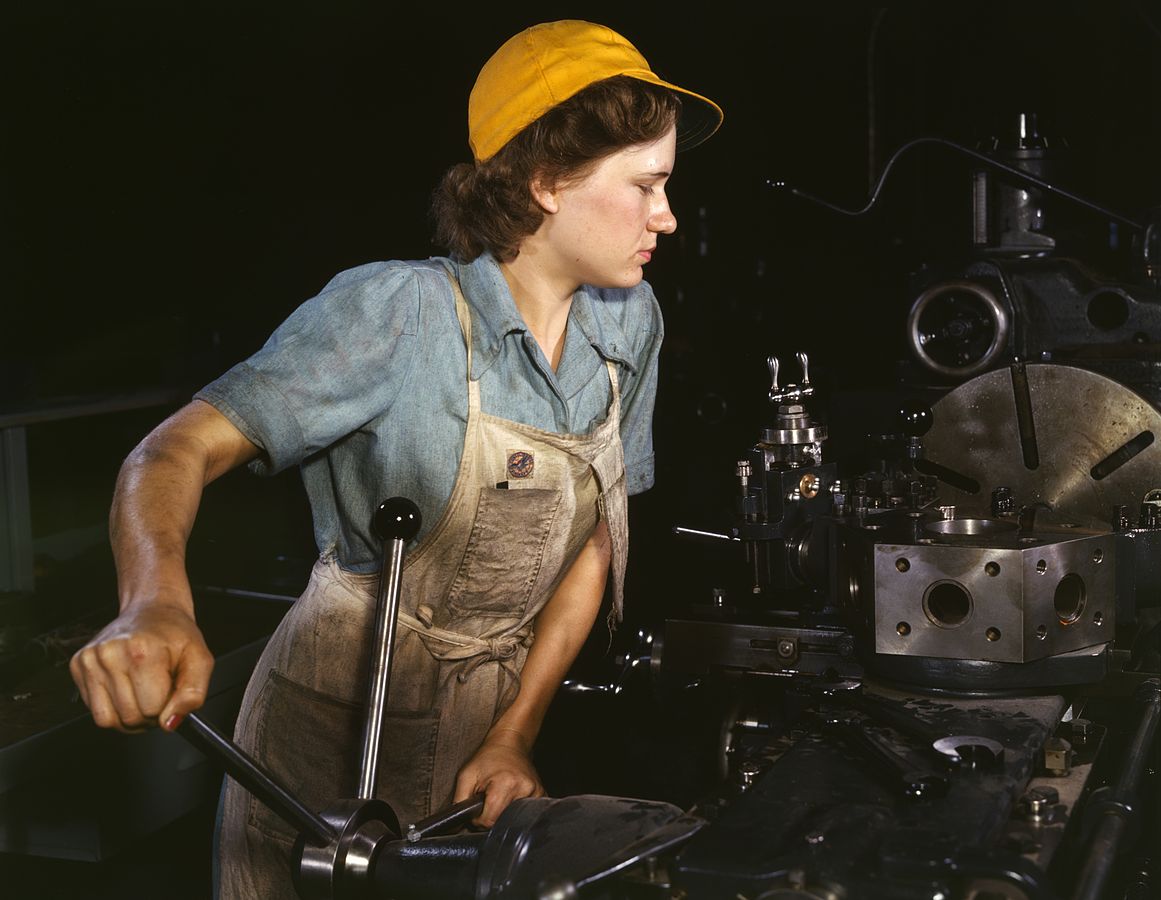
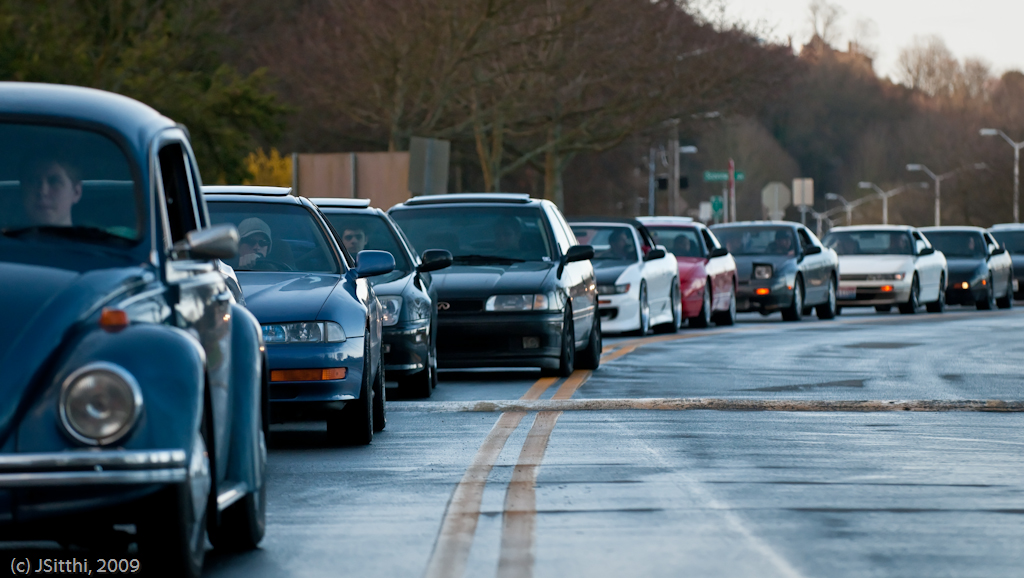
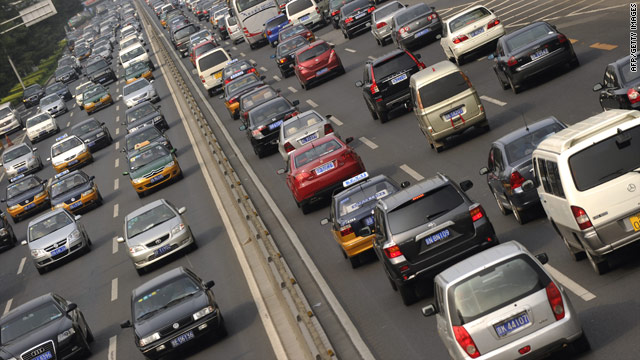
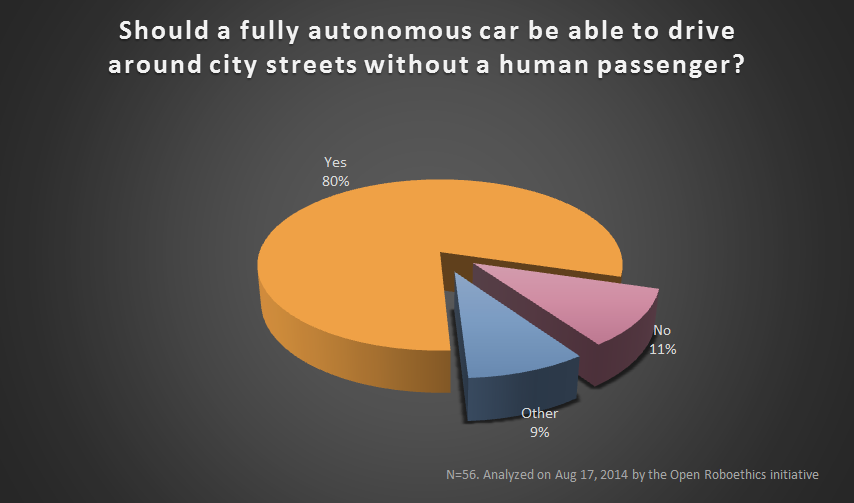
Pingback: Jobs in der Zukunft des Autonomen Fahrens? | Autonomes Fahren | Roboterautos
September 17, 2014